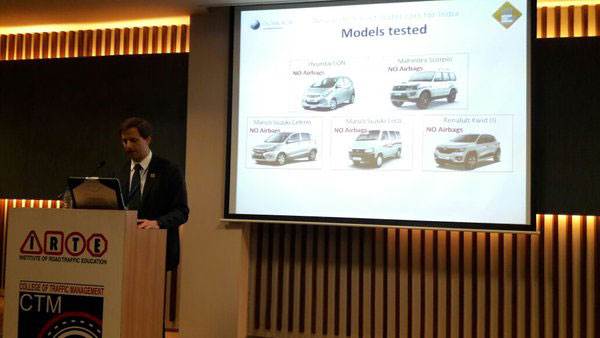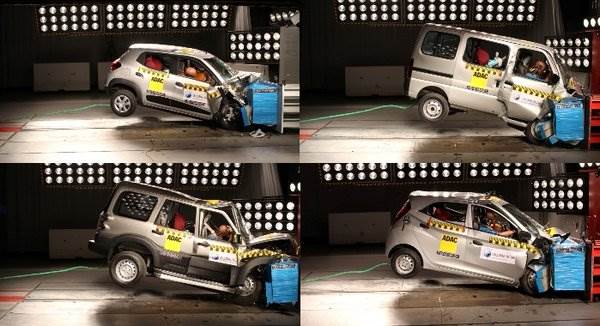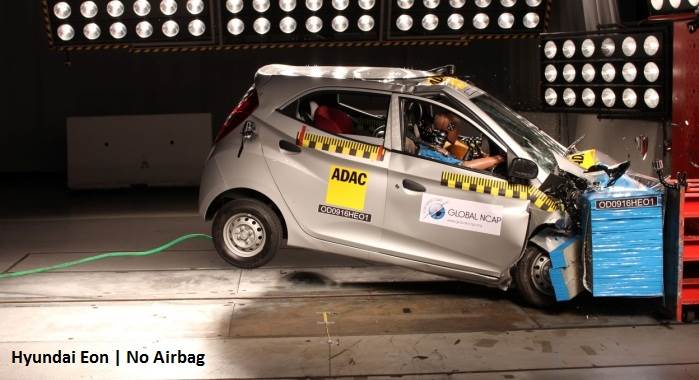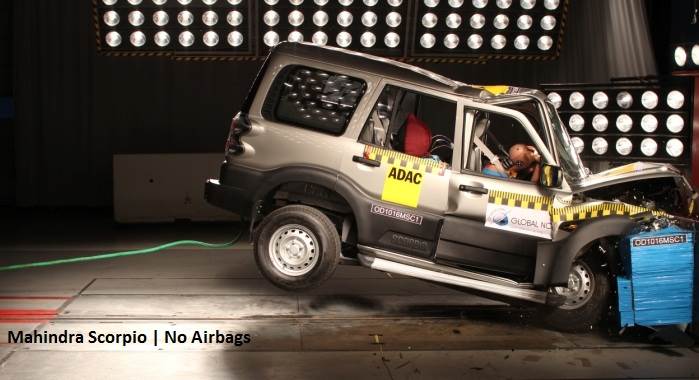All the Indian cars tested received zero star ratings in the latest round of test results released by Global NCAP in Faridabad today. This is despite the increasing awareness about vehicle safety in India. Manufacturers still have a long way to go when it comes to providing basic safety features on cars sold in the country.
After the initial round of tests in 2014, which were also the first ever independent safety tests for any Indian cars, the new set of Indian cars were expected to perform a lot better. GNCAP had then tested eight cars including Volkswagen Polo, Maruti Alto 800, Maruti Swift, Tata Nano, Hyundai i10, Ford Figo, Toyota Etios, and Datsun Go. Out of these, only the Polo and Etios, received four-star ratings for frontal protection, while all others got zero stars.
In the latest round of tests, the global automotive safety watchdog tested five high-selling Indian cars including the Renault Kwid, Maruti Suzuki Celerio, Maruti Suzuki Eeco, Mahindra Scorpio and Hyundai Eon, and found low levels of adult occupant protection on all these vehicles, which resulted in zero star ratings for all the five cars. The Renault Kwid was tested in three versions, including one with airbags, but each was rated as zero-star for adult safety.

All the cars were tested for crash safety at a speed of 64kph at which, the ‘unstable’ body shell on these cars collapsed, exposing the dummy occupants to life-threatening injuries.
Unveiling the latest crash test results during the Indian Automobile Safety Conference hosted by IRTE in Faridabad, David Ward, secretary general of Global NCAP said, “The latest ‘SaferCarsforIndia’ results show how important it is for cars to have a body shell that can remain stable in a crash. This is an absolutely crucial pre-requisite for occupant safety together with fitment at least of front airbags. It is very surprising that a manufacturer like Renault introduced the Kwid initially lacking this essential feature. Global NCAP strongly believes that no manufacturer anywhere in the world should be developing new models that are so clearly sub-standard.”
“Carmakers must ensure that their new models pass the UN’s minimum crash test regulations, and support use of an airbag,” he added. “The results highlight the importance of the Indian Government’s decision to mandate front and side impact crash tests from October 2017. Legislative action is needed to ensure that the minimum levels of occupant protection recommended by the United Nations are guaranteed for Indian consumers. But manufacturers don’t have to wait for legislation and we urge them to act to eliminate all zero-star cars from production as soon as possible.”
“Global NCAP also welcomes the forthcoming launch of a Bharat New Car Assessment Programme which can help build a market for safer cars in India,” Ward concluded.
How each car fared:
Renault Kwid
Global NCAP tested the standard version of the Kwid without airbags. It scored zero stars in adult occupant protection and two stars for child occupant protection. The collapse of the structure in the passenger compartment and the lack of airbags explained the poor result.
As a result of Global NCAP’s SaferCarsforIndia crash testing, Renault has sought to improve the safety performance of the Kwid. Four versions of the Kwid have been produced with different safety features, with the fourth only recently released and yet to be tested by Global NCAP.
Following safety improvements, Renault proposed that Global NCAP test an updated evolution of the Kwid in production from early April 2016. The car was tested with and without an airbag.
The new Kwid without an airbag scored zero stars in the adult occupant protection and two-stars in child occupant protection. The structure did not collapse however it was rated as unstable and that it could not withstand further loadings. It was possible to see the structural reinforcements implemented in this version of the Kwid but when Global NCAP checked the left (passenger) side, there were no reinforcements. The structure was reinforced only on the driver side.
The new Kwid with the addition of driver airbag was also tested. This version also scored zero stars in the adult occupant protection and two stars in child occupant protection. The structure was the same as the new Kwid without airbags, but a high compression in the dummy chest area explains the low score. Renault has confirmed that they will implement further improvements to the KWID and Global NCAP will test these new evolutions in forthcoming crash tests.
“We welcome Renault’s efforts to correct this and we look forward to testing another improved version with airbags. Renault has a strong record of achievement in safety in Europe and it should offer the same commitment to its customers in India,” Ward added.
However, despite the safety improvements Renault has sought to introduce, all of the versions tested to date have been rated as zero stars for adult protection.
Maruti Suzuki Eeco
The Eeco without airbags scored zero stars in the adult occupant protection and one star in child occupant protection. The collapse of the structure in the passenger compartment and the lack of airbags explained the poor result in adult occupant protection. This model does not offer optional airbags. Nevertheless, considering the structural collapse airbags are not likely to help avoid life-threatening injuries to the driver, Global NCAP said.
Hyundai Eon
The Hyundai Eon is offered in the standard version without airbags. It scored zero stars in the adult occupant protection and two stars for child occupant protection. The unstable structure in the passenger compartment and the lack of airbags explained the poor result in adult occupant protection.
Maruti Suzuki Celerio
The non-airbag Maruti Suzuki Celerio scored zero stars in adult occupant protection and one star in child occupant protection. The lack of airbags explained the poor result in adult occupant protection. The low score in child occupant protection is explained by the high values recorded in the three-year-old child dummy as well as its forward excursion beyond the accepted limits.
Mahindra Scorpio
The Scorpio was the only SUV to be tested, and the base variant which comes without airbags was the test mule. Despite its rugged image, the Scorpio shockingly scored zero stars in adult occupant protection and only two stars in child occupant protection. The collapse of the structure combined with the lack of airbags explains the score for adult occupant protection,




.jpg&w=700&c=1)

Comments
Member Login
Personal Details
No comments yet. Be the first to comment.